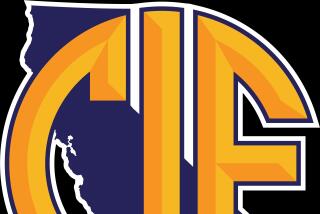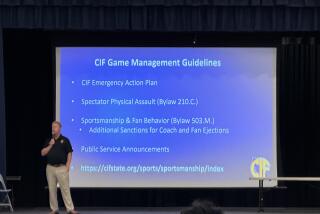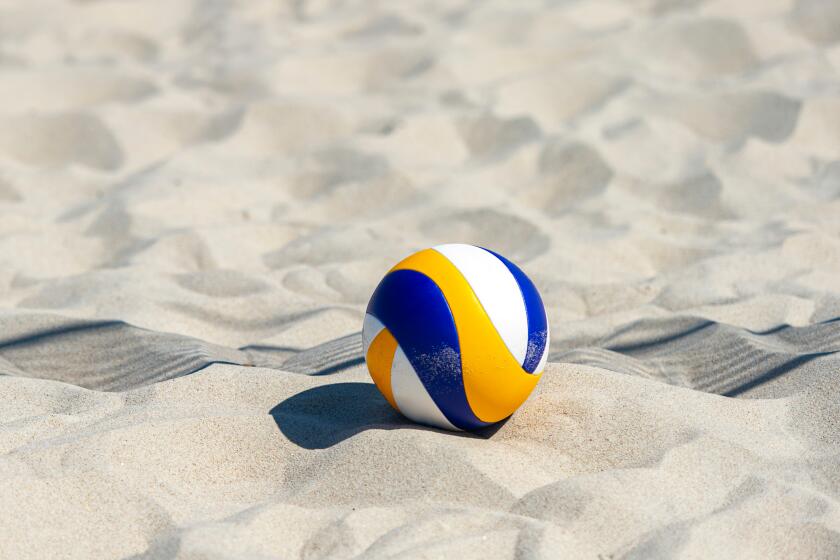Schools to Athletes: Pay to Play
- Share via
From the podium of the NCAA’s national convention to the playing fields of local junior colleges, the word is out: No pay, no play.
No more free rides. Easy street is closed. No matter how fast you can run, no matter how high you can jump, no matter how hard you can hit someone, if you’re not willing to pay by hitting the books, it is going to be harder and harder to qualify for intercollegiate athletics.
In New Orleans, the NCAA last month stuck to its stiff new academic standards for freshmen entering Division I schools.
In Georgia this month, a jury awarded $2.57 million to a teacher who claimed she had lost her job for fighting academic favoritism for athletes.
And now yet another avenue for the athlete struggling academically may be closing. Los Angeles community colleges, citing unacceptable expenses, are sending out layoff notices to coaches. The move could torpedo many athletic programs.
No question about it, the screws are tightening for the student athlete.
But has the word gotten through to the collegiate athletes of tomorrow?
Yes and no, says Dimitri Vadetsky, assistant principal in charge of athletics at Reseda High.
“The high school kids are getting the message,” Vadetsky says. “We have seminars, meetings, various programs on college preparedness, speakers from off-campus and a full-time college adviser. The more they hear about tightening down, the more good it does. You are always going to have some kids who think they can get by on their athletic skills. High school kids in general tend to be naive, so the more publicity there is, the more serious they realize these people are.
“People from the junior colleges come in and talk to them. They can go to our social hall and listen to a representative from Cal Poly SLO or USC or another college they want to attend.
“But when you make all this available to the ninth, 10th and 11th graders, it often falls on deaf ears. When these kids get in the 12th grade, however, they start to listen. When you’re in the ninth grade, it seems like forever until you go to college. A large percentage of the seniors wake up. Some never wake up.”
An example of the latter: one former Valley high school basketball player told a teacher, “I don’t need math. I can hire somebody to do that when I’m in the NBA.” This was not a kid with the skills to even play major-college ball, much less in the National Basketball Assn.
Vadetsky doesn’t expect any dramatic academic changes at the high school level to follow the lead of the colleges. As a matter of fact, he wonders who is following whom.
“I think we jumped the gun on the colleges,” he explains. “As you know, we had already put in the no fail / C average rule, which has forced student athletes to keep their grades up.”
That rule requires a student to maintain a C average and pass all his classes to remain eligible for extracurricular activities.
“We stay on top of it,” Vadetsky says. “The coaches do everything they can to keep their kids eligible. There is one coach who runs a study hall after school for his athletes. And it’s the coaches that are most important in all this. You and me can say things to the kids, but it’s what the coach says that kids always remember.”
Vadetsky looks at some kids, though, and just shakes his head.
“We have one kid,” he says, “who came into school with teeth that were rotting because they had never been taken care of. We arranged for him to go to a dental clinic. So what happens? He winds up leaving campus during school hours, going over to the park, doing nothing, smoking dope. Here he had a chance to get an education, get his teeth taken care of, do something with his life and his attitude is manana. “
Vadetsky remains a firm believer in the tougher standards.
“You want some guy in medical school to wind up being your doctor even though he wasn’t qualified?” Vadetsky asks. “I want the guy to get there only because he was qualified. College is supposed to be only for the top 10%.”
Tough talk? Sure is. But somebody’s got to get the word out, or a lot of ninth graders are going to continue to blissfully shoot their baskets and wait for the day when they can hire someone to do their math.
That day will never come.
More to Read
Go beyond the scoreboard
Get the latest on L.A.'s teams in the daily Sports Report newsletter.
You may occasionally receive promotional content from the Los Angeles Times.










